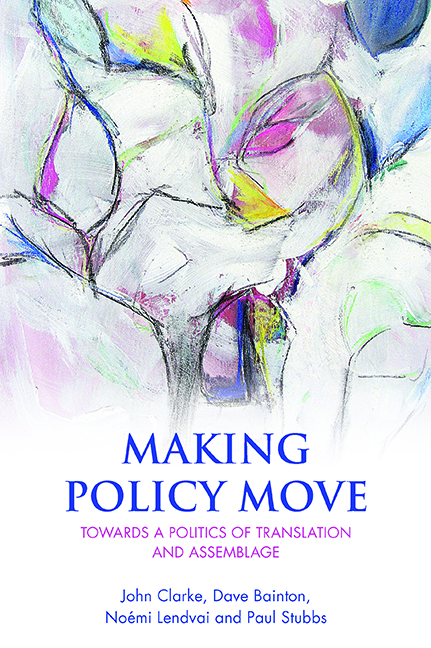Book contents
- Frontmatter
- Contents
- Introduction
- One Moving policy studies
- Two Translation, assemblage and beyond: towards a conceptual repertoire
- Three Performing reform in South East Europe: consultancy, translation and flexible agency
- Four The managerialised university: translating and assembling the right to manage
- Five Soft governance, policy fictions and translation zones: European policy spaces and their making
- Six Translating education: assembling ways of knowing otherwise
- Seven ‘Policy otherwise’: towards an ethics and politics of policy translation
- References
- Index
One - Moving policy studies
Published online by Cambridge University Press: 07 March 2022
- Frontmatter
- Contents
- Introduction
- One Moving policy studies
- Two Translation, assemblage and beyond: towards a conceptual repertoire
- Three Performing reform in South East Europe: consultancy, translation and flexible agency
- Four The managerialised university: translating and assembling the right to manage
- Five Soft governance, policy fictions and translation zones: European policy spaces and their making
- Six Translating education: assembling ways of knowing otherwise
- Seven ‘Policy otherwise’: towards an ethics and politics of policy translation
- References
- Index
Summary
Settling and unsettling policy and its study
Policy matters. In part at least, this is because policy involves social processes that are intertwined with people's lives, often in very profound, sometimes oppressive, and even violent, ways. This book is concerned with policy movement, including the mobility of policy across borders and boundaries. Associated in different ways with the dynamics of globalisation, the role of supranational organisations and agencies, or the spread of ‘best practice’, the trans-border, trans-boundary, movement of policies is visible on a large scale – whether this is the spread of Conditional Cash Transfer policies (see, eg, Ferguson, 2010; Lavinas, 2013), the rise of ‘austerity’ (Clarke and Newman, 2012; Blyth, 2013) or the propagation of the United Nations’ Millennium Development Goals (Gabay, 2012).
When policy moves, it is always translated: that is, it is made to mean something in its new context. Policy is never a singular entity: it is put together – or assembled – from a variety of elements that are always in the process of being reassembled in new, often surprising, ways. This concern with movement, translation and assemblage is central to our challenging of more conventional views of policy mobility, such as ‘policy transfer’, ‘policy diffusion’ or ‘policy learning’. Our concern is with the limitations of what we see as a conventional and linear approach to the policy process that too readily treats policy as a finished object. Instead, we will suggest that policy always involves practices of translation as policies are interpreted, enacted and assembled. Hence, we share, but also attempt to go beyond, a conception of policy as moving horizontally, across sites, and vertically, from policymaking centres to ‘implementation’ on the front line. As Kingfisher (2013: 3) argues:
[T]wo insights – policy as a power-laden artifact and architect of culture, and policy produced not only officially but also in myriad unofficial ways – serve to displace models of policy as rational, neutral and acultural, as well as to trouble visions of policy as something that can be implemented in any kind of straightforward, top-down, unmediated, and transparent manner. Instead, these insights invite us to envision the life of social policy – a process rather than a thing – as complex and convoluted, tracing and leaving traces of meaning and power as it travels across sites and through persons.
- Type
- Chapter
- Information
- Making Policy MoveTowards a Politics of Translation and Assemblage, pp. 9 - 32Publisher: Bristol University PressPrint publication year: 2015

